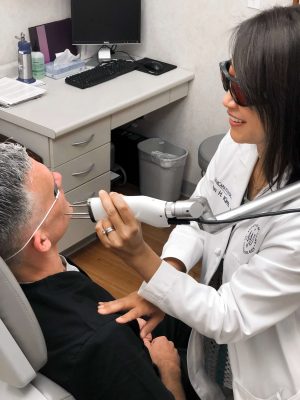- Home
- Blog
- Cosmetic Dermatology
- Understanding melasma triggers and treatments
Understanding melasma triggers and treatments
 Have you been noticing stubborn, brown patches on your face that aren’t fading after the summer? Persistent discoloration on the nose, cheeks, forehead and/or upper lip may suggest you have melasma. Here is dermatologist Dr. Karen Kim’s take on the condition.
Have you been noticing stubborn, brown patches on your face that aren’t fading after the summer? Persistent discoloration on the nose, cheeks, forehead and/or upper lip may suggest you have melasma. Here is dermatologist Dr. Karen Kim’s take on the condition.
Understanding melasma’s triggers
Melasma is a skin condition characterized by brown or grey-brown discoloration. It is due to overactive pigment-producing cells called melanocytes and tends to occur more often in women. It can be triggered by hormone fluctuations that occur during pregnancy, oral contraceptive intake or hormone replacement therapy. The face is the most common part of the body affected, however it may appear on the neck, chest and forearms as well. While the sun is the biggest culprit, heat and even visible light can exacerbate melasma. Although painless, melasma can have a large emotional impact on people suffering from it.
Treating melasma: key steps
Treating melasma is challenging. Having a board-certified dermatologist diagnose the condition and understand its triggers will be essential in determining the most effective treatment.
Managing melasma will require one or more of the following actions:
- Strict sun protection regimen: Given the large impact that sun exposure has on melasma, sun avoidance and vigilant sun protection are critical in any treatment of melasma. Regular use of hats is helpful. Mineral sunscreens (i.e., non-chemical) that contain titanium dioxide, iron oxide and zinc oxide are strongly recommended. They will block visible light as well as UV rays.
- New oral contraceptive: Addressing underlying hormone influences such as switching from oral contraceptives to a nonhormonal birth control method is recommended whenever possible.
- Topical or oral treatments: Topical skin lightening agents such as hydroquinone, retinoids, kojic acid, and tranexamic acid can reduce skin pigmentation. Oral agents have also been reported to be effective.
- Cosmetic procedures: Chemical peels and laser treatments with the Q- switched Nd:Yag laser, picosecond laser, or fractionated lasers can be helpful in some stubborn cases.
Not all skin hyperpigmentation is the same. Sun spots, post inflammatory hyperpigmentation and melasma can look similar to each other but respond very differently to treatment.
Consider a consultation with a board-certified dermatologist if you think you have melasma to help make the proper diagnosis and guide you on the most effective treatment plan.




Leave a Reply